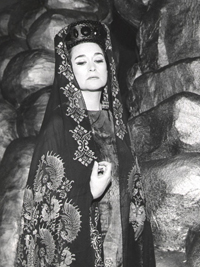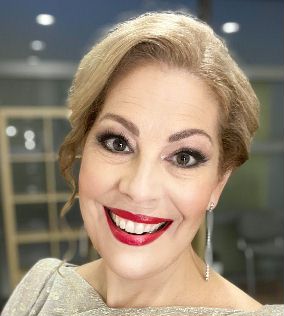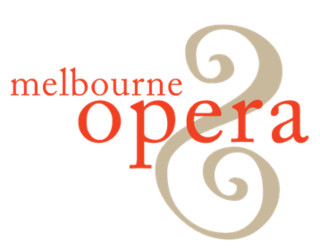Related Research Articles

Grace Melzia Bumbry was an American opera singer, considered one of the leading mezzo-sopranos of her generation, who also ventured to soprano roles. She belonged to a pioneering generation of African-American classical singers, led by Marian Anderson. She was recognized internationally when Wieland Wagner cast her for the 1961 Bayreuth Festival as Venus in Tannhäuser, the first black singer to appear at the festival.

Leopoldine Rysanek was an Austrian dramatic soprano.

Leyla Gencer was a Turkish operatic soprano.

Dame Gwyneth Jones is a Welsh dramatic soprano, widely regarded as one of the greatest Wagnerian sopranos in the second half of the 20th century.

Hasmik Papian is an Armenian soprano. She was awarded the People's Artist of Armenia title in 2004. Papian was named a Cultural ambassador of Armenia in the World for her contributions to Armenian culture in 2005 by the Catholicos of the Holy See of St. Echmiadzin and All Armenians Karekin II and awarded the Order of Saint Sahag and Saint Mesrob and Order of Saint Mesrop Mashtots.
Eliane Coelho is a Brazilian soprano singer. She was a soprano in the Frankfurt Opera and performed dozens of roles at the Vienna Staatsoper.

Herva Nelli was an Italian and American operatic soprano.

Violeta Urmanavičiūtė-Urmana is a Lithuanian opera singer who has sung leading mezzo-soprano and soprano roles in the opera houses of Europe and North America.
Sylvie Valayre is a French operatic soprano known for her versatile interpretations of lyric, spinto, and dramatic coloratura soprano parts. She sings grueling roles like Abigaille, Lady Macbeth or Turandot as well as lighter pieces like Giordano's Maddalena, Cio-Cio San, or Verdi's Desdemona at major opera houses around the world.

Mariella Devia is an Italian operatic soprano. After beginning her career as a lyric coloratura soprano, in the finale part of it she also enjoyed considerable success with some of the most dramatic roles in the bel canto repertoire.

Sondra Dee Radvanovsky is an American and Canadian soprano. Specializing in 19th-century Italian opera, Radvanovsky is widely regarded as a leading interpreter of bel canto, verismo, and works by Giuseppe Verdi. Her repertoire includes the title roles in Médée, Norma, Tosca, and Rusalka, Leonora in Il trovatore, Lady Macbeth in Macbeth, and Donizetti's "Tudor Queens": the title roles in Anna Bolena, Maria Stuarda, and Elizabeth I in Roberto Devereux.

Melbourne Opera was founded in 2002 as a charitable not-for-profit company dedicated to producing opera and associated art forms in Melbourne, Australia. With philanthropic assistance it has also toured to outer-suburban and regional Victorian theatres, as well as to Canberra and Hobart interstate. Despite receiving no government funding since its foundation, the company mounts between three and five main stage productions each year. Its principal rehearsal and performance home is the Athenaeum Theatre.

Sonya Yoncheva is a Bulgarian operatic soprano, producer and founder of SY11 Productions company and Bulgarian Artist magazine.
Géraldine Chauvet is a French operatic mezzo-soprano.

Petra Schmidt is a German operatic soprano and academic. A member of the Musiktheater im Revier (MiR), she has appeared in title roles such as Dvořák's Rusalka and Ponchielli's La Gioconda. She has also worked as a voice teacher at the Kassel University.
Jolanta Omilian, real name: Jolanta Omiljanowicz-Quattrini, is a Polish opera singer, singing mainly belcanto and dramatic soprano parts.

Dragana Radakovic is an operatic soprano, conductor and academic. With a flexible voice, she is able to sing bel canto as well as dramatic soprano roles. She has appeared at major opera houses in title and leading roles, including Bellini's Norma, Verdi's Aida, and Puccini's Turandot.
Raehann Bryce-Davis is an American operatic mezzo-soprano and producer. Bryce-Davis attended the University of Texas at Arlington and the Manhattan School of Music, where she was a student of Cynthia Hoffmann. She is a winner of the 2018 George London Award at the George London Competition, the 2017 Concorso Lirico di Portofino, the 2016 Richard F. Gold Career Grant from Merola Opera Program, the 2015 International Hilde Zadek Competition in Vienna and the 2015 Sedat Gürel- Güzin Gürel International Voice Competition in Istanbul. Bryce-Davis has been acclaimed across Europe and North America for her portrayals of Verdi roles such as Eboli, Azucena, and Preziosilla, as well as bel canto heroines such as Leonora from Donizetti's La Favorite and Sara in Roberto Devereux. In concert, solo highlights include performances of Verdi's Requiem at Carnegie Hall with the Oratorio Society of New York with Maestro Kent Tritle, Verdi's Requiem with the Montreal Symphony Orchestra under Maestro Kent Nagano, Elgar's Sea Pictures at the Vienna Musikverein with Maestro Jun Märkl, and a Grammy Nominated performance of Pulitzer Prize winning Paul Moravec and Mark Campbell's Sanctuary Road.
Mirjam Tola is an Albanian operatic soprano and voice teacher. She is also an Austrian citizen.
Csilla Boross is a Hungarian operatic soprano who has had an active international career since her professional debut in 2003. She is particularly well known for her portrayal of Abigaille in Giuseppe Verdi's Nabucco. In 2009 she was the recipient of the Thalia Award and in 2016 she was awarded the Knight's Cross of the Hungarian Order of Merit.
References
- ↑ "2005 – The Final, BBC Cardiff Singer of the World – 2005 competitors". BBC. Retrieved 10 March 2018.
- ↑ "2016 Honours are announced – Royal Academy of Music". www.ram.ac.uk. Retrieved 10 March 2018.
- 1 2 "Australia: Helena Dix". BBC. 1 July 2005. Retrieved 10 April 2018.
- ↑ "Associated Board Annual Review 2003" (PDF). ABRSM. 2004. p. 26. Retrieved 10 April 2018.
- ↑ "Programm | Archiv | Archiv 16/17 | Wiederaufnahmen | Oper | Cristina, Regina Di Svezia | Oldenburgisches Staatstheater". staatstheater.de (in German). Archived from the original on 24 May 2016. Retrieved 9 April 2018.
- ↑ "Chelsea Opera Group". Cadogan Hall. Retrieved 9 April 2018.
- ↑ Nürnberg, Staatstheater. "Attila | Staatstheater Nürnberg". www.staatstheater-nuernberg.de (in German). Retrieved 9 April 2018.
- ↑ "Diary: Theater Lübeck". operabase.com. Retrieved 9 April 2018.
- ↑ Castilla, El Norte de. "La JOUVA elige La Gioconda para su décimo Proyecto Ópera". www.elnortedecastilla.es (in Spanish). Retrieved 9 April 2018.
- ↑ "English National Opera – Parsifal @www.classicalsource.com" . Retrieved 9 April 2018.
- ↑ "Chelsea Opera Group Chorus and Orchestra". Cadogan Hall. Retrieved 9 April 2018.
- ↑ Design, Site Buddha Web. "Lustige Witwe 2008 | Tour | Opera Scotland". www.operascotland.org. Retrieved 9 April 2018.
- ↑ "Marriage of Figaro – West Green House Opera". britain-australia.org.uk. Retrieved 9 April 2018.
- ↑ "Stuart Skelton and Barrie Kosky win at Opera Awards – Limelight". Limelight. Retrieved 9 April 2018.
- 1 2 Knowlton, Cassidy (8 May 2021). "Verdi's Macbeth at Her Majesty's Theatre review". Time Out Melbourne . Retrieved 4 April 2023.
- ↑ Zwartz, Barney (16 August 2022). "The Australian soprano hitting all the career high notes". The Age . Retrieved 4 April 2023.
- ↑ Groch, Sherryn (29 April 2020). "Australian opera singer among those hit by COVID-19 blood clot mystery". The Sydney Morning Herald .
- ↑ Evans, Steve (6 November 2018). "Opera star hits wrong note with 'spineless creep' British nationalist". The Sydney Morning Herald . Retrieved 4 April 2023.
- ↑ Salazar, Francisco (25 March 2023). "Helena Dix Replaces Sonya Yoncheva in Final Met Opera Norma Performance". OperaWire. Retrieved 4 April 2023.
- ↑ Streaming audio of Norma (25 March 2023), Met Opera on Demand; "CID:357850", Met Opera Archive.
- ↑ Holdsworth, Rob. "Roberto Devereux (Melbourne Opera)" . Retrieved 9 April 2018.
- ↑ Zwartz, Barney (12 November 2017). "Melbourne opera – Roberto Devereux: Helena Dix imbues work with real credibility". The Age . Retrieved 9 April 2018.
- ↑ "Das Liebesverbot, Chelsea Opera Group, Cadogan Hall | The Arts Desk". www.theartsdesk.com. 26 October 2015. Retrieved 9 April 2018.